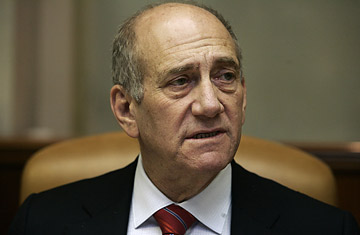
Israeli Prime Minister Ehud Olmert.
In what was may have been his last cabinet meeting, disgraced Israeli Prime Minister Ehud Olmert on Sunday displayed rare flashes of the forceful, straight-talking leader that he might have been. He told his ministers that "the notion of a Greater Israel no longer exists, and anyone who still believes in it is deluding themselves" — suggesting that Israel will have to give up settlements built outside its 1967 borders, often on the claim of a Biblical right, if its wants peace with the Arab world.
It was this sort of blunt realism that made Israelis vote for Olmert's centrist Kadima party in March 2006. But that Olmert, the pragmatic peace-maker, vanished soon after his victory, only to be replaced by another Olmert, feinting and dodging like an outclassed boxer, who clung to power by forever cutting new deals with rightwing coalition partners to refrain from pressing forward on the key peace-making issues of the future of Jerusalem and the West Bank settlements.
Now, Olmert faces a possible indictment for fraud and corruption, and is expected to resign after Kadima chooses a replacement party leader in primaries to be held on Wednesday. Olmert could officially step down on Thursday, but stay on as a caretaker premier until the new Kadima leader forges a governing coalition — a process that could drag on for months. Still, that could give Olmert a last chance to redeem his legacy by acting on his new-found courage.
As things stand, Olmert may go down as one of the most reviled leaders in Israel's history: He is blamed for the fiasco of the 2006 Lebanon war in which the deterrent myth of the Israeli military's invincibility — shared by Arab regimes and the Israeli public — was badly dented. And to coddle his coalition partners, he stalled on turning U.S.-sponsored talks with the Palestinians into any meaningful peace process, although, to be fair, the ascendancy of the Islamist Hamas movement in Palestinian territories had rendered Olmert's partner, President Mahmoud Abbas, something of a lame duck.
Following the Lebanon war, his popularity dived to an abysmal 3% approval rating. It seldom climbed back into double-digits, except, briefly, when Olmert orchestrated an air attack on a suspected nuclear facility in Syria and a high-ranking Hezballah commander, Imad Mugniyah, was killed last February in Damascus in a car-bombing widely viewed as the work of the Mossad.
The prime minister's tenure was dogged by police investigations that culminated in an American-Jewish businessman testifying that he had given Olmert over $100,000, mostly in cash-stuffed envelopes. Allegations later emerged that Olmert had taken luxury trips abroad and double-billed various Jewish charities for his costs. If the expected criminal case against Olmert is proven, he may be the first Israeli leader forced to resign from office for corruption.
